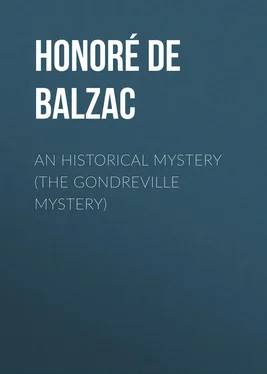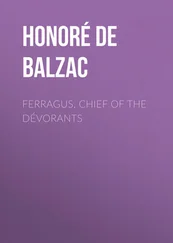Honoré Balzac - An Historical Mystery (The Gondreville Mystery)
Здесь есть возможность читать онлайн «Honoré Balzac - An Historical Mystery (The Gondreville Mystery)» — ознакомительный отрывок электронной книги совершенно бесплатно, а после прочтения отрывка купить полную версию. В некоторых случаях можно слушать аудио, скачать через торрент в формате fb2 и присутствует краткое содержание. Жанр: literature_19, foreign_antique, foreign_prose, на английском языке. Описание произведения, (предисловие) а так же отзывы посетителей доступны на портале библиотеки ЛибКат.
- Название:An Historical Mystery (The Gondreville Mystery)
- Автор:
- Жанр:
- Год:неизвестен
- ISBN:нет данных
- Рейтинг книги:3 / 5. Голосов: 1
-
Избранное:Добавить в избранное
- Отзывы:
-
Ваша оценка:
- 60
- 1
- 2
- 3
- 4
- 5
An Historical Mystery (The Gondreville Mystery): краткое содержание, описание и аннотация
Предлагаем к чтению аннотацию, описание, краткое содержание или предисловие (зависит от того, что написал сам автор книги «An Historical Mystery (The Gondreville Mystery)»). Если вы не нашли необходимую информацию о книге — напишите в комментариях, мы постараемся отыскать её.
An Historical Mystery (The Gondreville Mystery) — читать онлайн ознакомительный отрывок
Ниже представлен текст книги, разбитый по страницам. Система сохранения места последней прочитанной страницы, позволяет с удобством читать онлайн бесплатно книгу «An Historical Mystery (The Gondreville Mystery)», без необходимости каждый раз заново искать на чём Вы остановились. Поставьте закладку, и сможете в любой момент перейти на страницу, на которой закончили чтение.
Интервал:
Закладка:
The evening after this terrible tumult, Laurence so entreated her cousins to leave the country, fearing treachery on the part of Malin, or some trap into which they might fall, that they took horse that night and gained the Prussian outposts. They had scarcely reached the forest of Gondreville before the hotel Cinq-Cygne was surrounded; Malin came himself to arrest the heirs of the house of Simeuse. He dared not lay hands on the Comtesse de Cinq-Cygne, who was in bed with a nervous fever, nor on Laurence, a child of twelve. The servants, fearing the severity of the Republic, had disappeared. The next day the news of the resistance of the brothers and their flight to Prussia was known to the neighborhood. A crowd of three thousand persons assembled before the hotel de Cinq-Cygne, which was demolished with incredible rapidity. Madame de Cinq-Cygne, carried to the hotel Simeuse, died there from the effects of the fever aggravated by terror.
Michu did not appear in the political arena until after these events, for the marquis and his wife remained in prison over five months. During this time Malin was away on a mission. But when Monsieur Marion sold Gondreville to the Councillor of State, Michu understood the latter’s game, – or rather, he thought he did; for Malin was, like Fouche, one of those personages who are of such depth in all their different aspects that they are impenetrable when they play a part, and are never understood until long after their drama is ended.
In all the chief circumstances of Malin’s life he had never failed to consult his faithful friend Grevin, the notary of Arcis, whose judgment on men and things was, at a distance, clear-cut and precise. This faculty is the wisdom and makes the strength of second-rate men. Now, in November, 1803, a combination of events (already related in the “Depute d’Arcis”) made matters so serious for the Councillor of State that a letter might have compromised the two friends. Malin, who hoped to be appointed senator, was afraid to offer his explanations in Paris. He came to Gondreville, giving the First Consul only one of the reasons that made him wish to be there; that reason gave him an appearance of zeal in the eyes of Bonaparte; whereas his journey, far from concerning the interests of the State, related to his own interests only. On this particular day, as Michu was watching the park and expecting, after the manner of a red Indian, a propitious moment for his vengeance, the astute Malin, accustomed to turn all events to his own profit, was leading his friend Grevin to a little field in the English garden, a lonely spot in the park, favorable for a secret conference. There, standing in the centre of the grass plot and speaking low, the friends were at too great a distance to be overheard if any one were lurking near enough to listen to them; they were also sure of time to change the conversation if others unwarily approached.
“Why couldn’t we have stayed in a room in the chateau?” asked Grevin.
“Didn’t you take notice of those two men whom the prefect of police has sent here to me?”
Though Fouche made himself in the matter of the Pichegru, Georges, Moreau, and Polignac conspiracy the soul of the Consular cabinet, he did not at this time control the ministry of police, but was merely a councillor of State like Malin.
“Those men,” continued Malin, “are Fouche’s two arms. One, that dandy Corentin, whose face is like a glass of lemonade, vinegar on his lips and verjuice in his eyes, put an end to the insurrection at the West in the year VII. in less than fifteen days. The other is a disciple of Lenoir; he is the only one who preserves the great traditions of the police. I had asked for an agent of no great account, backed by some official personage, and they send me those past-masters of the business! Ah, Grevin, Fouche wants to pry into my game. That’s why I left those fellows dining at the chateau; they may look into everything for all I care; they won’t find Louis XVIII. nor any sign of him.”
“But see here, my dear fellow, what game are you playing?” cried Grevin.
“Ha, my friend, a double game is a dangerous one, but this, taking Fouche into account, is a triple one. He may have nosed the fact that I am in the secrets of the house of Bourbon.”
“You?”
“I,” replied Malin.
“Have you forgotten Favras?”
The words made an impression on the councillor.
“Since when?” asked Grevin, after a pause.
“Since the Consulate for life.”
“I hope there’s no proof of it?”
“Not that!” said Malin, clicking his thumb-nail against his teeth.
In few words the Councillor of State gave a clear and succinct account of the critical position in which Bonaparte was about to hold England, by threatening her with invasion from the camp at Boulogne; he explained to Grevin the bearings of that project, which was unobserved by France and Europe but suspected by Pitt; also the critical position in which England was about to put Bonaparte. A powerful coalition, Prussia, Austria, and Russia, paid by English gold, was pledged to furnish seven hundred thousand men under arms. At the same time a formidable conspiracy was throwing a network over the whole of France, including among its members montagnards, chouans, royalists, and their princes.
“Louis XVIII. held that as long as there were three Consuls anarchy was certain, and that he could at some opportune moment take his revenge for the 13th Vendemiaire and the 18th Fructidor,” said Malin, “but the Consulate for life has unmasked Bonaparte’s intentions – he will soon be emperor. The late sub-lieutenant means to create a dynasty! This time his life is in actual danger; and the plot is far better laid than that of the Rue Saint-Nicaise. Pichegru, Georges, Moreau, the Duc d’Enghien, Polignac and Riviere, the two friends of the Comte d’Artois are in it.”
“What an amalgamation!” cried Grevin.
“France is being silently invaded; no stone is left unturned; the thing will be carried with a rush. A hundred picked men, commanded by Georges, are to attack the Consular guard and the Consul hand to hand.”
“Well then, denounce them.”
“For the last two months the Consul, his minister of police, the prefect and Fouche, hold some of the clues of this vast conspiracy; but they don’t know its full extent, and at this particular moment they are leaving nearly all the conspirators free, so as to discover more about it.”
“As to rights,” said the notary, “the Bourbons have much more right to conceive, plan, and execute a scheme against Bonaparte, than Bonaparte had on the 18th Brumaire against the Republic, whose product he was. He murdered his mother on that occasion, but these royalists only seek to recover what was theirs. I can understand that the princes and their adherents, seeing the lists of the emigres closed, mortgages suppressed, the Catholic faith restored, anti-revolutionary decrees accumulating, should begin to see that their return is becoming difficult, not to say impossible. Bonaparte being the sole obstacle now in their way, they want to get rid of him – nothing simpler. Conspirators if defeated are brigands, if successful, heroes; and your perplexity seems to me very natural.”
“The matter now is,” said Malin, “to make Bonaparte fling the head of the Duc d’Enghien at the Bourbons, just as the Convention flung the head of Louis XVI. at the kings, so as to commit him as fully as we are to the Revolution; or else , we must upset the idol of the French people and their future emperor, and seat the true throne upon his ruins. I am at the mercy of some event, some fortunate pistol-shot, some infernal machine which does its work. Even I don’t know the whole conspiracy; they don’t tell me all; but they have asked me to call the Council of State at the critical moment and direct its action towards the restoration of the Bourbons.”
Читать дальшеИнтервал:
Закладка:
Похожие книги на «An Historical Mystery (The Gondreville Mystery)»
Представляем Вашему вниманию похожие книги на «An Historical Mystery (The Gondreville Mystery)» списком для выбора. Мы отобрали схожую по названию и смыслу литературу в надежде предоставить читателям больше вариантов отыскать новые, интересные, ещё непрочитанные произведения.
Обсуждение, отзывы о книге «An Historical Mystery (The Gondreville Mystery)» и просто собственные мнения читателей. Оставьте ваши комментарии, напишите, что Вы думаете о произведении, его смысле или главных героях. Укажите что конкретно понравилось, а что нет, и почему Вы так считаете.












